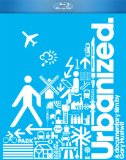| Reviews & Columns |
|
Reviews DVD TV on DVD Blu-ray 4K UHD International DVDs In Theaters Reviews by Studio Video Games Features Collector Series DVDs Easter Egg Database Interviews DVD Talk Radio Feature Articles Columns Anime Talk DVD Savant Horror DVDs The M.O.D. Squad Art House HD Talk Silent DVD
|
DVD Talk Forum |
|
|
| Resources |
|
DVD Price Search Customer Service #'s RCE Info Links |
|
Columns
|
|
|
Urbanized
THE MOVIE:
Gary Hustwit's movies, as a general rule, don't sound as interesting as they are. His latest documentary, Urbanized, is the third film in his "Design Trilogy"; the first (Helvetica) was about typefaces, and the second (Objectified) was about industrial design. Urbanized is about urban planning--understanding "the language of a city." Let's be honest: these pictures, by all rights, should be dull as toast. Yet Hustwit brings them to fascinating life, thanks to his impeccable eye and genuine curiosity. The focus of these films, he has said in interviews, is to make us think about things we take for granted. In Urbanized, as in its predecessors, he gets that job done.
The film opens with a series of snazzy (and shocking) animations detailing the growth of cities over the past few decades--and the direction they're going. Overcrowding is a real concern--which prompts Hustwit to ask important questions about how to solve the problems of slum living around the world. How do we make cities work? And to answer that question, he looks at some cities that have succeeded, and some that have failed, and examines why--without the use of narration, guided only by the interview subjects (planners and architects, mostly).
The picture is admirably ambitious, trotting from Chile (home of "participatory design") to Bogota (which made great strides in public transportation) to Copenhagen (home of a successful push for bicycle use) to New York (where an abandoned railroad track was repurposed into the popular "High Line"). Questions of a city's architectural identity are posed, most explicitly in the battles between New York urban planner Robert Moses and activist Jane Jacobs. Hustwit looks at suburbanization by going to Phoenix, Arizona, a poster city of urban sprawl; he examines the resultant abandonment of the city by traveling to Detroit. And, most intriguingly, he looks at how public and community interactions change personal behavior (as in Brighton) and public policy (the protests of the "Stuttgart 21 project" in Germany).
If that sounds like a lot of ground to cover in 84 minutes, it is. But director Hustwit and editors Michael Culyba and Shelby Siegel move gracefully from one topic to the next, never lingering, yet never seeming to rush. The pace is snappy and the visuals are compelling, from ingenious montages of signs and arrows to a fascinating on-screen demonstration of exactly how the eye works. All of it comes wrapped in Luke Geisbuhler's marvelous cinematography, which never fails to find a poetic composition, even in the most unlikely of places.
THE BLU-RAY:
Video & Audio:
Geisbuhler's marvelous city cinematography is lovingly rendered by the MPEG-4 AVC-encoded, 1080p transfer. The clean HD image is outstanding; colors pop right off the screen, lines are clean and attractive, and if there were any digital bugaboos, I didn't see them. Interviews are sharp and good-looking as well.
More disappointing is the lack of a lossless track, with the disc instead offering up 5.1 and 2.0 Dolby Digital mixes. But the surround track is perfectly acceptable, with interview audio nice and clear in the center channel, while music and effects are spread to the surrounds. The rear channels are somewhat underutilized (street noise is there, but could be made a bit more present), and the quiet stretches of interview audio occasionally require some volume jockeying. Overall, though, the track is just fine.
English subtitles are also available.
Extras:
Simplicity--the section is labeled merely "Extras" (53:36), and it includes extended interviews, deleted scenes, and "a few shots we liked that didn't make it in." The exclusions certainly make sense (the film is not a moment too long at 84 minutes), but these added bits and pieces are interesting (and occasionally beautiful) in their own right.
FINAL THOUGHTS:
Urbanized stumbles a bit in its closing scenes, seemingly unsure of exactly how to put a bow on its big box of assembled ideas. It's only upon arriving at the point of the film that one would bookmark for a conclusion that we realize we're not entirely sure what the filmmakers have been driving at, aside from asking some interesting questions and presenting some compelling ideas. Then again, in today's marketplace, that's as good a reason as for a movie to occupy our time.
Jason lives in New York. He holds an MA in Cultural Reporting and Criticism from NYU.
|
| Popular Reviews |
| Sponsored Links |
|
|
| Sponsored Links |
|
|
| Release List | Reviews | Shop | Newsletter | Forum | DVD Giveaways | Blu-Ray | Advertise |
|
Copyright 2024 DVDTalk.com All Rights Reserved. Legal Info, Privacy Policy, Terms of Use,
Manage Preferences,
Your Privacy Choices | |||||||














